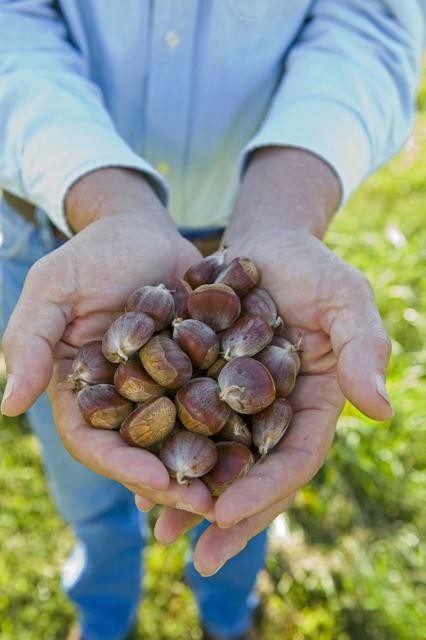The Cataloochee Ranch is on a mission: to rescue the American chestnut. These trees once populated dense forests across North America, including our region, but now even a single tree is a rare commodity.
The trouble started in 1904, when a Chinese chestnut tree was shipped to New York City, bringing blight along with it. The airborne fungus swept through the continent destroying American chestnut trees that were not resistant to the disease.
"The chestnut, when it was around, it was the most important tree we had," says Judy Coker, a former board member with The American Chestnut Foundation. The trees made excellent timber and the nuts were very productive, she says, feeding everything from bears to turkeys.
Now that American chestnut trees are in short supply, The Cataloochee Ranch in Maggie Valley is doing something about it. Twenty years ago, Coker, who grew up at the Cataloochee Ranch, found a chestnut tree with several prized nuts inside its burs. She planted three of them where the ranch's orchard sits now, "just for the fun of it."
Those trees sent up sprouts that now produce heavily. Today, three rows of pure American chestnut trees dot the ranch's landscape, as well as 19 back-crossed trees that are a hybrid of the American and Chinese species.
The American Chestnut Foundation, a national organization based in Asheville, harvested its first "potentially blight-resistant" chestnuts in 2005. The organization is now rigorously testing the trees and hopes to return the American chestnut to its "former niche in the Appalachian hardwood forest ecosystem."
Judy Coker envisions a forest of American chestnut trees that blankets our area's hillsides. The Cataloochee Ranch's current trees are "very pampered" and receive regular watering and fertilizing. She hopes that the trees will be able to live in the wild and fend for themselves one day, perhaps in the next 8-10 years.
Until then, the public is invited to visit the Cataloochee Ranch's orchard on Wednesdays at 11 a.m. Guided tours cost $15 and include lunch. Self-guided tours are also available at any time. Coker recommends calling ahead for the guided tours, although visitors are welcome to explore the orchard without an appointment (donations encouraged). http://www.cataloocheeranch.com, http://www.acf.org or 926-1401.
Get to know a tree
Curious about WNC's woodlands? Get up close and personal with "Meet our Appalachian Forests," a seven-week series hosted by Luke Cannon, a local permaculturalist and ethnobotanist. The class will meet at Asheville Botanical Gardens to discover new and traditional ways to "deepen our relationships with the life on our vibrant planet."
Visits to several forests are an essential part of the curriculum. Potential destinations include Rattlesnake Lodge and Joyce Kilmer Memorial Forest, among others. Many topics will be discussed, including the fate and importance of the American chestnut tree.
"Understanding the ecological and historical impacts of [the American chestnut's] life and death is a crucial part of understanding the current complexity of our modern forests and all the lives within," says Cannon.
Learn more about American chestnut trees, as well as our region's mushrooms, birds, insects and plants, two Saturdays per month, Aug.-Nov. $300 includes optional camp out. Space is limited; registration required. Info: http://avl.mx/ya






Before you comment
The comments section is here to provide a platform for civil dialogue on the issues we face together as a local community. Xpress is committed to offering this platform for all voices, but when the tone of the discussion gets nasty or strays off topic, we believe many people choose not to participate. Xpress editors are determined to moderate comments to ensure a constructive interchange is maintained. All comments judged not to be in keeping with the spirit of civil discourse will be removed and repeat violators will be banned. See here for our terms of service. Thank you for being part of this effort to promote respectful discussion.